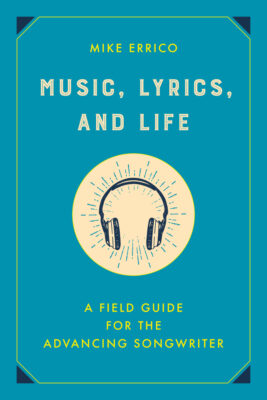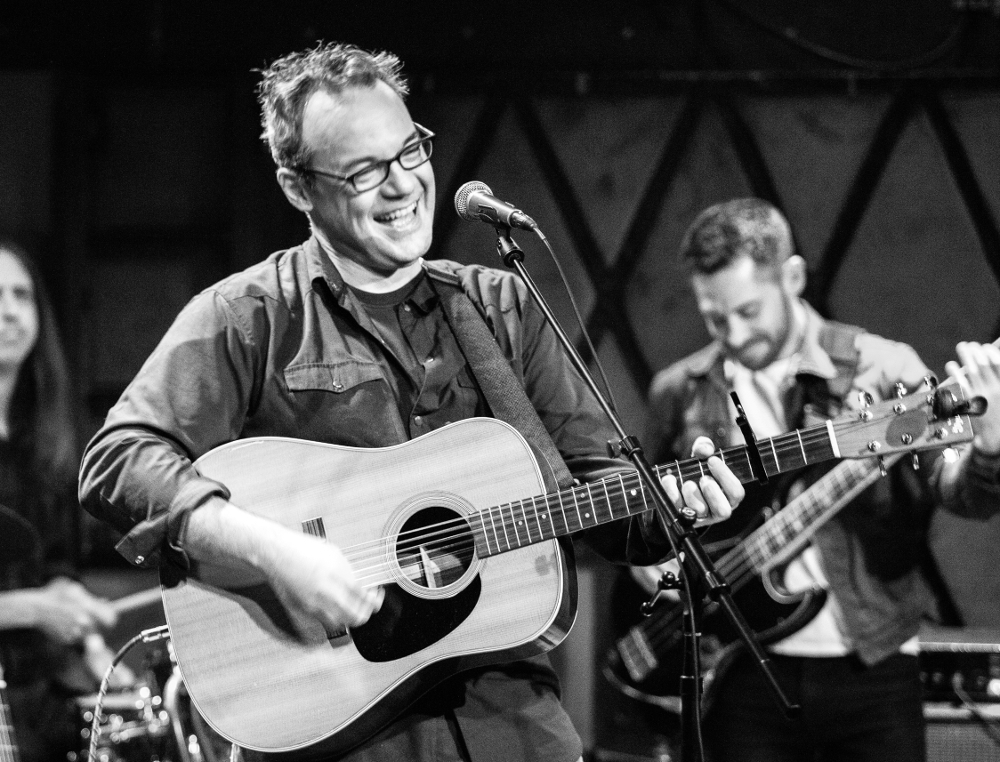Songwriters: Meet Your Field Guide
When I was a student at NYU’s Clive Davis Institute of Recorded Music, I had the fortune of studying under some of the most incredible teachers, from Bob Power and Nick Sansano to Questlove and Jason King. The entire program focused on music entrepreneurship and the idea of being a well-rounded and educated music professional.

The book “Music, Lyrics, and Life: A Field Guide For The Advancing Songwriter” by Mike Errico is out now.
Songwriting teacher Mike Errico exemplified all the qualities of a pro music entrepreneur teaching at NYU and Yale, all while performing under his own artist name and authoring best-selling books on music. His new title, Music, Lyrics, and Life: A Field Guide For The Advancing Songwriter has gotten a lot of attention – I was excited for this opportunity to interview my former songwriting teacher.
Congrats on your book, Music, Lyrics, and Life: A Field Guide For the Advancing Songwriter. Can you talk about some of your former songwriting students, some of whom are interviewed in the book?
First off, I’m grateful that so many of them came out to be a part of the book—and that includes you, my friend. I really think of us as a team, and I spend a lot of time trying to find opportunities to connect former students to each other. I have an Instagram account dedicated to the amazing stuff everybody’s doing, and there’s also a Facebook page where we share job opportunities, gear, etc…, but that one’s secret.
On the teaching side, I’ve been able to get great guests because I know them from my songwriting career. I’m grateful that they trust me enough to put their name on something I’m doing. The result is that I get to speak to people like Sarah Solovay and Madison Love, who are writing major hits for Jason Derulo, Selena Gomez, Lady Gaga, and so on; or Madison Cunningham and Raul Midón, artists who have several Grammy nominations between them; or Jay Joyce, Benny Blanco and Shane McAnally, who are writing and producing for Kacey Musgraves, Justin Bieber, Rihanna…I mean, it goes on and on.
But I have to issue a caveat: While it’s true that several of my past students have gone on to enormous success, a lot of my students aren’t going to end up being songwriters at all. I don’t count either as personal success or failure. I mean, can you imagine if your high school physics teacher based their worth on how many of their students became famous physicists? The asylums would be full of high school physics teachers. And yet, so many principles that were learned in physics are applicable to other fields and to the living of a richer, more informed life. And that’s really what I try to focus on.
How long does it take you to write a book like this?
The short answer is, “disgustingly long.” Like, “What am I doing with my life?”–long. I dedicate a chapter to how many books I had to write to find this one, and depending on how you count, this was my fifth shot.
First, I wrote a book, and it was terrible; then I wrote another, and it, too, was terrible; I wrote a third, and abandoned it because it was going terribly; I wrote a fourth and got it read by an industry professional, who told me it was half-terrible, but also half good, and if I just cut out the terrible part and insert a new, non-terrible second part, I’d have something good.
So, that comes out to five, right? Five-ish, for sure. But it was totally worth it.
How do songwriters get around writer’s block?
Here’s the thing about writer’s block: There’s no such thing. It’s the Bigfoot of artistic maladies. The term was coined in the 1940s by Dr. Edmund Bergler, an Austrian Freudian psychiatrist who blamed writer’s block on some seriously Freudian suspects: “milk-denying mothers” mostly, but also mental states that include the words “anal,” “phallic,” “oral,” “abortive”—you get it.
Here’s the part that gets me: There is a cure for the invented affliction known as writer’s block. After thousands of pages written on this topic, the lab-coated studies, the academic papers, the peer-reviewed research, the postgraduate dissertations, the cure is, are you ready:
Write through it.
That’s it. And what that means is that the cure for the disease is to ignore the disease and do what you’d be doing if you didn’t have it. You read that right: The treatment is the same, whether you have it or not.
If you’re having trouble writing, you’re not suffering from writer’s block. You’re afraid. And fear is very real, and debilitating. So, the question becomes, “How do we conquer fear?”
Well, maybe it helps to think of it this way: If you’re a kid and you think there’s a monster under the bed, and you’re terrified, how do you get un-terrified? You look under the bed.
Translated to songwriting, this means keep writing. Look under the bed. Write about what you’re afraid of. Chances are, your listeners may be afraid of the same thing, and they’ll relate.
Can songwriting be taught?
Partially, yes. And to a specific subsection of the songwriting community, absolutely yes.
Of course, there are the people who walk into my class with an innate gift of how melody and structure flows, and for them, sometimes all I can do is encourage them to finish as much as possible, and to challenge them to stretch into areas they hadn’t considered. Which, frankly, is a lot.
But the writers I can help most obviously are the ones who are maybe not as gifted naturally, but who make up for it by being hell-bent to be a songwriter. They’re early for class; they set up weekly office hours; they apply for all the internships; they co-write with everyone they possibly can; they wake up in the morning wondering how they can get better. I work hard to fill up their toolkits with all the stuff I put in the book, and their songs improve drastically by the time the semester ends.
I won’t lie: Tears get shed, and not just by students. It’s deeply gratifying for everyone involved.
Have you improved as a songwriter by teaching?
Great question. I would say I have not gotten better as a songwriter, because I’m not actually songwriting—it’s not about me.
I have become a much better teacher, which also means I’m better at editing, punching up, tightening, and encouraging writing that is intrinsic to whoever is writing. So, I’ve been called in by labels and managers to troubleshoot younger artists’ work and get to the heart of what they’re trying to say, and my inbox is stuffed with former students’ demos and rough drafts.
If I’ve developed any superpower during all this, it’s that I’m able to see when someone is “standing in their light”—when they’ve tripped over something, or opened a door in their writing, sometimes without even noticing. That’s when it gets really exciting, and I’ll call it out in class: “That? Is a door. Walk through it. And take us with you.”
Your chapter on money discusses how musicians will struggle for their art, but do you have any immediate tips for our audience on monetizing their skills?
I think about this so much. I want to pitch a class to Yale, or NYU, or whoever will have me, entitled, simply, “HOW DO I GET PAID?” And I think it should be all caps, just like that, like a pop song.
The most immediate tip I have for students who come to my classes is to understand that a song is also intellectual property, and that you need to respect that aspect of the work.
In the first week of fall semester, I ask students how many are registered with a performing rights organization—ASCAP, BMI, SESAC, or any of the other international organizations. I never get a 100% show of hands, so that’s where we start. And it’s a good place, because it causes them to take stock of their inventory of songs, and to organize their catalog. From there, all other money-making platforms are easier to sign up with: Soundexchange; the MLC (Mechanical Licensing Collective); and so forth.
And I never leave out Bandcamp, a platform that has a better pay structure, but also gives you the data of the people who buy your stuff. Those are the people you can target for shows and other promotions — they’re the fanbase that will be more loyal than any streaming service or social media platform.
As someone who balances a career as an educator, author, artist and songwriter, do you have any tips for SonicScoop readers on balancing multiple professions?
I think the only way everything balances is when you’re the one deciding what “balance” looks like. What has helped me is to have good heroes and to cultivate my own definition of success that no one can shake.
For me, it includes service to others. Not for selfish reasons but because everything is connected to who you are, not just as a writer but as a person and a citizen.
The irony is that when you work selflessly, so much more comes back to you. Teaching and mentoring has done this for me, and it’s not because it helps me write; it helps me live, and the writing is part of that living.
— Matthew Wang
Please note: When you buy products through links on this page, we may earn an affiliate commission.








[…] This is a great one, written by Matthew Wang. […]